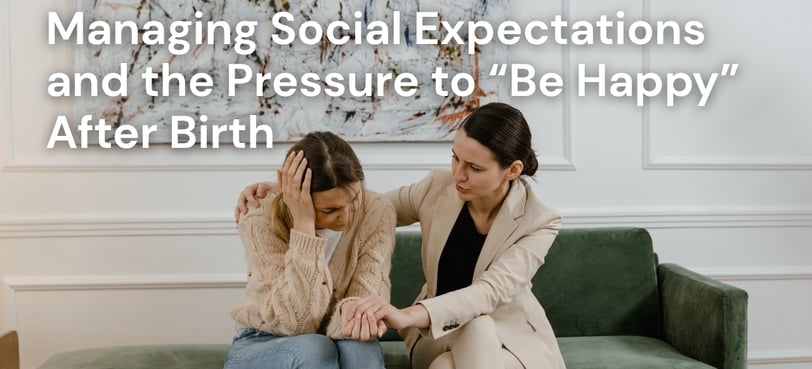Managing Social Expectations and the Pressure to “Be Happy”
7/2/20254 min read


Motherhood is often wrapped in ribbon and soft lighting—baby showers, heartfelt Instagram posts, comments like “You must be over the moon!” or “Enjoy every moment!” Society paints a romanticized image of new parenthood. But for many mothers, this carefully curated version of motherhood doesn’t match their internal reality—especially if they are experiencing postpartum depression (PPD).
Instead of joy, they feel numbness. Instead of gratitude, grief. And layered on top of this emotional weight is a second, quieter burden: the pressure to be happy to smile, post photos, and assure everyone they’re “fine.”
At Peace Temple, we meet parents daily who say, “I feel like I’m failing because I’m not enjoying this the way everyone else seems to.” This tension between private pain and public performance is one of the most overlooked struggles in the postpartum period.
This article explores how social expectations shape a mother’s mental health and how we can begin to unlearn the pressure to perform joy when what we need is support.
The Cultural Ideal of the “Happy Mother”
From birth announcements to mom blogs, the message is clear: motherhood is supposed to be blissful. This narrative is reinforced in subtle ways:
Commercials with glowing, laughing mothers
Comments from friends or family like “Isn’t this the best time of your life?”
Social media feeds filled with curated snapshots of joy
While these images can be beautiful, they’re also deeply incomplete. When a mother is struggling, they become painful mirrors of what she thinks she’s supposed to feel—but doesn’t.
This ideal doesn’t leave room for:
Hormonal crashes and emotional fragility
Birth trauma or breastfeeding struggles
Sleep deprivation and identity confusion
Mental health conditions like PPD, anxiety, or OCD
The result? Silence, shame, and emotional isolation masked by a smile.
How Social Pressure Fuels Postpartum Depression
1. Inauthenticity Increases Isolation
When a mother feels pressure to act happy, she may avoid speaking honestly—even with loved ones. Over time, this creates an internal divide: the outer performance vs. the inner experience.
This can lead to:
Emotional numbness
A sense of inauthenticity or disconnection
Delays in seeking help
Heightened feelings of shame or failure
At Peace Temple, we remind clients: masking your pain isn’t a sign of strength—it’s a sign that support is urgently needed.
2. Guilt for Not Meeting Expectations
When society defines motherhood as joyful, any deviation from that can feel like a personal shortcoming. Mothers often internalize thoughts like:
“What’s wrong with me? Other women love this.”
“My baby is healthy—why am I not happy?”
“Maybe I’m just not cut out for this.”
These thoughts don’t emerge in a vacuum, they’re born from social scripts that fail to include struggle in the picture of motherhood.
3. Fear of Being Judged
Many mothers with PPD fear being labelled as ungrateful, dramatic, or unstable. As a result, they minimize their pain, say they’re “just tired,” and try to soldier on alone.
The fear of judgment, especially from other mothers or older generations, can become a barrier to treatment and healing.
Reframing the Narrative: You Don’t Have to Be Happy - You Just Have to Be Honest
The first step in resisting this pressure is reframing what postpartum success looks like. It’s not about blissful bonding, endless energy, or loving every moment. It’s about being real, resourced, and supported.
You are allowed to say:
“I love my baby and I’m struggling.”
“I don’t feel like myself right now.”
“This isn’t what I expected and that’s okay.”
At Peace Temple, we work with mothers to reclaim their truth—to give language to what’s really happening beneath the surface.


How to Cope With Social Pressure and Emotional Performance
1. Curate Your Social Media Intake
Unfollow accounts that make you feel inadequate. Follow pages that talk openly about PPD, anxiety, and the complexity of motherhood. Choose representation over perfection.
If you’re struggling with the curated joy of others, remind yourself: social media is not real life. No one posts pictures of their panic attacks or 2 A.M. crying spells.
2. Tell the Truth in Safe Spaces
Identify one or two people who feel emotionally safe. Practice honesty in small doses:
“Today was hard.”
“I haven’t felt like myself lately.”
“I think I need to talk to someone.”
These admissions create the groundwork for authentic connection and real help.
3. Give Yourself Permission to Feel It All
Joy, grief, exhaustion, awe they can all exist in the same hour. Postpartum life is not a single mood. It’s a mosaic.
Allowing yourself to feel what’s real is a powerful act of resistance against the myth of constant happiness.
4. Set Boundaries With Well-Meaning Visitors
Not every visitor needs access to your emotional world. If someone expects smiles and small talk you’re not ready for, it’s okay to decline or limit their time.
Try:
“We’re keeping things low-key for now, thanks for understanding.”
“I appreciate your support, but I’m not up for visits just yet.”
5. Normalize Help-Seeking
Therapy, medication, peer support—none of these are signs of failure. They are signs of bravery and commitment to healing.
Peace Temple’s perinatal mental health team offers non - judgmental care tailored to the emotional realities of new parents—not the myths.
If You’re Supporting Someone With PPD
If you're a friend, partner, or family member, avoid empty reassurances like:
“You have so much to be happy about.”
“This is just a phase.”
Instead, say:
“I’m here for you, even if you don’t feel okay.”
“You don’t have to pretend around me.”
“How can I support you today?”
Offer presence, not platitudes.
Final Thoughts: You Don’t Owe Anyone a Smile
The pressure to “be happy” after having a baby is one of the cruelest burdens a mother can carry. It silences pain. It distorts reality. And it isolates the very people who need support the most.
You don’t owe the world a curated version of your motherhood.
You owe yourself rest. Compassion. Honesty. And the right to heal on your own terms.
At Peace Temple, we hold space for the full, messy, beautiful truth of parenthood including the parts you’ve been told to hide.
Because being real is brave. And healing begins where honesty lives.
